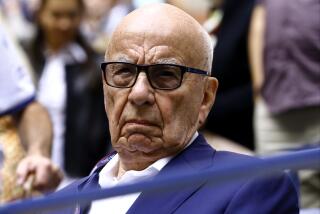Bulls and Bears on Rukeyser’s Departure
- Share via
WASHINGTON — It never quite rose to the level of the Ted Koppel versus David Letterman media frenzy, but the demise of PBS’ “Wall Street Week With Louis Rukeyser” has created more than its share of buzz among the financial set.
At the center has been Rukeyser himself--voice cracking, eyes dancing, looking for all the world like a parody of the mad newsman Howard Beale in the 1976 movie “Network” since Maryland Public Television, the entity responsible for the show, unceremoniously announced plans to replace him.
“I want you to rise out of your chair--not to shout, ‘I’m mad as hell and not going to take it anymore,’ but to ... write or e-mail your local station saying you heard Louis Rukeyser is still going to have a program and you’d like to see it,” he told viewers on what turned out to be his last show a week ago. “I promise you that if enough of you do that, it will do the job.”
There has been a sympathetic media outpouring, mingled with outrage from the 22 most frequent guests, most of whom owed their fame and in some cases their fat portfolios to exposure on the show and who are now--surprise!--boycotting the successor program.
“An island of wit, decorum and knowledge in a sea of junk,” was just one of the bouquets to Rukeyser, this thrown by the Baltimore Sun.
But by week’s end, detractors were weighing in as well. An unabashed egotist, they snickered. A 69-year-old, white-haired veteran who didn’t know how to leave the stage gracefully. A tycoon fighting to hold on to his national platform to protect his lucrative empire of speeches, cruise ship lectures and newsletters, estimated to bring in at least $20 million a year.
“Lou Rukeyser believed too many of his own press clippings,” said Dean Rotbart, a former Wall Street Journal columnist who writes a media newsletter called newsroomconfidential.com. In a piece headlined, “King Lou Is Dethroned but Still Won’t Shut Up,” Rotbart added, “Lou drowned in his own pomposity and doesn’t even know it.”
It was Maryland Public Television, which sponsored the show from Owings Mills, Md., for all of its 32 years, that made the decision to replace Rukeyser. After his on-air outburst, the producing station quickly scheduled a replacement edition Friday, featuring as host 72-year-old Marshall Loeb, former managing editor of Fortune; 84-year-old Julius Westheimer, former Baltimore stockbroker; sixtysomething technical analyst Bernadette Murphy; and 55-year-old James Grant, editor of Grant’s Interest Rate Observer. The featured guest was the baby of the show, 47-year-old Gus Sauter, who manages mutual funds for Vanguard Group.
Yet if the temporary lineup appears to diminish the chances Rukeyser can sue PBS for ageism, it also added more pink to the already red faces at Maryland Public Television, where vice president Jeff Hankin has been telling reporters that “the purpose of the change is to make the show relevant to today’s investor population.”
Rukeyser’s rousing of his viewers definitely had impact. USA Today reported Thursday that PBS affiliates across the country were recording viewer reaction “unprecedented in volume and venom, with fans threatening to withhold contributions.” The PBS station in Sacramento alone received 400 outraged viewers’ complaints.
“It’s clear that 99.99% of the country regards this as stupid and graceless,” Rukeyser said in an interview from his Greenwich, Conn., home, citing the thousands of calls logged by one station, all favorable toward the show.
Rukeyser’s ratings were reasonably healthy--about 2 million viewers weekly, compared with the 8 million or so who regularly tune in “Antiques Roadshow,” PBS’ top-ranked program. Although down from an estimated high of 5 million in 1982, Rukeyser’s ratings still made his show one of the main events in its genre.
“If they had approached me nicely, we could have had an amicable, proper and gracious parting,” Rukeyser said. “So many are now saying, ‘Lou, don’t desert us.’ And I won’t.”
So abrupt was the departure, Rukeyser said, that Maryland Public Television confiscated his photographs, shut down the show’s Web site and fired his producer and assistant.
Rukeyser vows to return, saying his phone has been ringing off the hook with offers for a rival business show. And many loyal viewers and colleagues will go with him. “I don’t think anyone combines his quick wit and devastating questions,” said Frank Cappiello, a frequent panelist since the show’s start in 1970.
But public broadcasting officials are sanguine that by the debut in late June of “Wall Street Week With Fortune”--the new show they designed with a reduced role for Rukeyser in mind--the flap will have faded like an old Hollywood diva.
Among those delighted at Rukeyser’s fall are the stock-market bears, who say that Rukeyser was a great cheerleader for capitalism who seemed never to want to hear a negative word.
“I find it ironic that the TV show treated him the way he treated the bears,” said William Fleckinstein, a Seattle investment advisor. “He was extremely disdainful to anyone with a bearish view. He preferred pompoms to doing research.”
Nonsense, said Rukeyser, who insists he warned frequently about the Internet boom with such pithy, punning lines as, “The new theme on Wall Street appears to be dot-com all ye faithful.”
One thing unlikely to change--either at the new “Wall Street Week” without Louis Rukeyser or at whatever new venture Rukeyser cooks up from his Connecticut home--is a guest list heavy on expertise--and conflicts of interest.
In a piece that aired on another PBS show, “The NewsHour With Jim Lehrer,” media reporter Terence Smith spotlighted the “significant and profitable financial relationships” panelists and their investment firms sometimes have with the companies whose stocks they recommend.
Rukeyser’s response? “The suggestion that people of the highest quality are shills is insulting to them and the viewers,” he said.
There is no hint from Maryland Public Television that it plans to upset that particular apple cart. “We never script the guests,” said vice president Hankin.
What is clear is that PBS’ president and chief executive, Pat Mitchell, has created a climate of change that influenced Maryland Public Television to try to recast Rukeyser. A former president of CNN Productions and Time Inc. Television, Mitchell has in the last two years moved “Masterpiece Theatre” from Sunday to Monday night, brought the first American detective to the “Mystery” series that has long featured their British cousins and generally shaken the place up.
But if Rukeyser is banished, can this really be public television?
“I’m a little hard-pressed to see how ‘Wall Street Week With Louis Rukeyser’--without Louis Rukeyser--is going to be a big hit on Friday nights,” said Brian Rogers, a T. Rowe Price mutual fund manager who withdrew from the show after Rukeyser was removed.
T. Rowe Price, along with Oppenheimer Funds, was an underwriter of the show. A spokesman said last week it had no comment on whether it would continue to fund “Wall Street Week.”
The show’s legacy may be harder to define, measured in the portfolios of millions of viewers who took or ignored the advice doled out by guests. One study by Bloomberg News found that over a five-year period, year-end predictions from Rukeyser’s top panelists beat the performance of the Standard & Poor’s 500 index by 5%.
Then there’s the grateful support of those whom Rukeyser helped put on the map. “Being on the show was like getting a papal blessing,” said Mario Gabelli, a New York analyst who was on the show seven times--but who’s counting? “Twenty years ago, when I was a rookie, it was like getting the Good Housekeeping seal of approval.”
More to Read
Sign up for Essential California
The most important California stories and recommendations in your inbox every morning.
You may occasionally receive promotional content from the Los Angeles Times.













